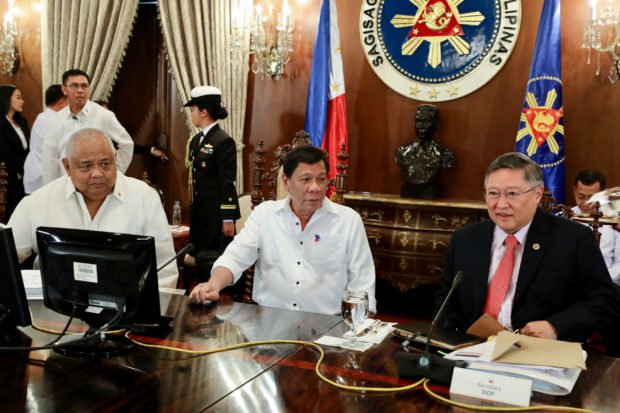Duterte allies in Senate seen approving more economic reforms

President Rodrigo Roa Duterte presides over a meeting in Malacañang in this file photo taken on June 27, 2017. Also in the photo are Executive Secretary Salvador Medialdea and Finance Secretary Carlos Dominguez III. (PHOTO BY RICHARD MADELO/PRESIDENTIAL PHOTO)
MANILA, Philippines–With the majority of the incoming Senate allied to President Rodrigo Duterte, Capital Economics expects passage of more economic reforms even as the London-based research firm warned of looming dictatorship.
“The strong performance by Duterte’s supporters in the midterm elections should lead to further progress on pushing through economic reforms. However, the results will do little to stop the country’s slide towards autocracy, and bode poorly for the country’s long-term prospects,” Capital Economics Asia economist Alex Holmes said in a May 15 report titled “Philippines: elections bode poorly for long-run outlook.”
The May 13 elections saw opposition candidates shut out of the winning circle of 12 new senators who will join 12 incumbents with three more years remaining in their terms.
Of the 24 senators likely to take part in the 18th Congress, only a handful were expected to be critical of the current administration.
On the bright side and for the short term, Capital Economics said that a Senate majority supportive of the Mr. Duterte “should make it easier for the President to push through legislation.”
“The Duterte administration has so far introduced a number of useful economic reforms, and we expect this to continue,” Capital Economics noted, particularly citing the Tax Reform for Acceleration and Inclusion (TRAIN) Law and rice tariffication.
“The first batch of tax measures under the TRAIN reforms enacted last year widened the tax base and raised government revenues. This should help to fund the much-needed upgrades to the country’s infrastructure, which we have long argued is vital to improving the economy’s long-term prospects,” it said.
“Scrapping rice import quotas, which have protected rice farmers, has also brought benefits in the form of lower prices. Opening up the agricultural sector to more competition should help boost productivity over the longer term,” it added.
As the Duterte administration pursues a total of seven packages under its comprehensive tax reform program, Capital Economics said the pending second package on corporate income taxation dubbed as the Tax Reform for Attracting Better and Higher Quality Opportunities (Trabaho) bill augurs well to attracting more investments.
“[Trabaho] aims to replace the current system of sprawling tax incentives with a lower corporate tax rate—the current rate is one of the highest in the region. Reducing the complexity of the tax system and lowering the tax rate should, all else equal, provide a boost to investment,” Capital Economics explained.
But for the long term, Capital Economics was wary about the extent of President Duterte’s further growing influence.
“Attempts to improve the business environment have been undermined by the actions of the President himself. Duterte’s increasingly autocratic tendencies, including his willingness to undermine political institutions and attack his opponents, have caused foreign investors to take fright. New approvals of foreign direct investment in 2017 and 2018 were less than half the average of what they were under Duterte’s predecessor,” Capital Economics said, citing Philippine Statistics Authority (PSA) data on investment promotion agencies’ (IPA) approvals of foreign-led projects seeking tax incentives and other perks.
“The result of the midterms, which were seen by many as a referendum on Duterte’s first three years, are likely to embolden the President further. Duterte now has a good chance of being able to garner the three-quarters majority support in the Senate which he needs to change the Constitution. Duterte is trying to decentralize power across the country, a move we think would cause inequality across the country to widen even further. The change also risks concentrating even more power in the hands of the country’s self- interested political elites,” it said.
Duterte was pushing for change into a federal form of government, even as the administration’s economic managers themselves had warned that doing so without several years of preparation and transition would “wreak havoc” to the economy and the country’s fiscal state. (Editor: Jonathan P. Vicente)